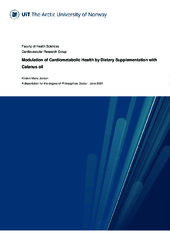| dc.contributor.advisor | Aasum, Ellen | |
| dc.contributor.author | Jansen, Kirsten Maria | |
| dc.date.accessioned | 2021-08-26T12:02:56Z | |
| dc.date.available | 2021-08-26T12:02:56Z | |
| dc.date.issued | 2021-09-17 | |
| dc.description.abstract | Obesity leads to alterations in myocardial metabolism, expressed as an increased utilization of fat for energy purposes at the expense of carbohydrate. This shift in energy metabolism is associated with impairment of ventricular function which can lead to heart failure. This thesis raises the question of whether dietary supplementation with Calanus oil, a novel marine oil derived from the marine copepod, Calanus finmarchicus (Norwegian, raudåte), can attenuate obesity-related changes in metabolism and associated co-morbidities.
The major finding in this thesis project was that dietary Calanus oil was able to prevent obesity-related shifts in myocardial metabolism and restore the capacity of the heart to utilize carbohydrate as energy source. In addition, we demonstrated that Calanus oil had a cardioprotective action, in the sense that recovery ventricular function following an ischemic insult of hearts from mice receiving high-fat diet with Calanus oil was superior to that of control hearts. To examine the mechanism involved, we exposed H9c2 cardiomyoblast to lipotoxic stress (palmitic acid) with and without micromolar concentrations of hydrolysed wax ester from Calanus oil (WEH). Live cell imaging revealed major cell death in response to palmitiate-exposure, while co-incubation with WEH almost completely rescued the cells. Further analyses suggested that WEH protects H9c2 cardiomyocytes from lipotoxicity by attenuating the associated ER stress, as well as alleviating palmitate-induced impairment of autophagic flux. This thesis also showed that Calanus oil, at least to some extent, were able to antagonize obesity-induced changes in the gut microbiota composition. In conclusion, the present results show that dietary supplementation with Calanus oil has the potential to attenuate obesity-induced alterations in myocardial metabolism and, in addition, protect the heart towards ischemic stress, and may therefore be an alternative to anti-obesity/anti-diabetic drugs. | en_US |
| dc.description.doctoraltype | ph.d. | en_US |
| dc.description.popularabstract | Obesity causes alterations in the energy metabolism of the heart which can lead to heart failure. Using diet-induced obese mice, we show that dietary supplementation with Calanus oil was able to prevent such obesity-related shifts in myocardial metabolism and to protect the heart towards experimentally induced myocardial infarction. Using a cardiomyocyte cell line, we also found that small amounts of hydrolyzed wax ester from Calanus oil, containing a unique composition of (mono- and poly-unsaturated) fatty acids and fatty alcohols, almost completely rescued the cells from nutritional stress induced by the saturated fatty acid, palmitate. Further analyses suggest that this protective effect was due to alleviation of so-called endoplasmatic reticulum (ER) stress. Finally, we showed that Calanus oil antagonized some of the obesity-induced alterations in the gut microbiota. Collectively, these data suggest that Calanus oil can be an alternative to anti-obesity/anti-diabetic drugs. | en_US |
| dc.description.sponsorship | UiT the Arctic University of Norway | en_US |
| dc.identifier.uri | https://hdl.handle.net/10037/22254 | |
| dc.language.iso | eng | en_US |
| dc.publisher | UiT The Arctic University of Norway | en_US |
| dc.publisher | UiT Norges arktiske universitet | en_US |
| dc.relation.haspart | <p>Paper I: Jansen, K.M., Moreno, S., Garcia-Roves, P.M. & Larsen, T.S. (2019). Dietary Calanus oil recovers metabolic flexibility and rescues postischemic cardiac function in obese female mice. <i>American Journal of Physiology - Heart and Circulatory Physiology, 317</i>(2), H290-H299. Also available at <a href=https://doi.org/10.1152/ajpheart.00191.2019>https://doi.org/10.1152/ajpheart.00191.2019</a>. Accepted manuscript version available in Munin at <a href=https://hdl.handle.net/10037/18212>https://hdl.handle.net/10037/18212</a>.
<p>Paper II: Jansen, K.M., Hansen, S.S., Larsen, K.B., Hafstad, A.D., Olsen, R.L., Larsen, T.S. & Aasum, E. Hydrolysed wax ester from Calanus oil protects H9c2 cardiomyoblasts from palmitate – induced lipotoxicity. (Manuscript).
<p>Paper III: Schots, P.C., Jansen, K.M., Mrazek, J., Pedersen, A.M., Olsen, R.L. & Larsen, T.S. (2020). Obesity-induced alterations in the gut microbiome in female mice fed a high-fat diet are antagonized by dietary supplementation with a novel, wax ester-rich, marine oil. <i>Nutrition Research, 83</i>, 94-107. Also available in Munin at <a href=https://hdl.handle.net/10037/19971>https://hdl.handle.net/10037/19971</a>.
<p>Review: Larsen, T.S. & Jansen, K.M. (2021). Impact of Obesity-Related Inflammation on Cardiac Metabolism and Function. <i>Journal of Lipid and Atherosclerosis, 10</i>(1), 8-23. Also available at <a href= https://doi.org/10.12997/jla.2021.10.1.8> https://doi.org/10.12997/jla.2021.10.1.8</a>. | en_US |
| dc.rights.accessRights | openAccess | en_US |
| dc.rights.holder | Copyright 2021 The Author(s) | |
| dc.rights.uri | https://creativecommons.org/licenses/by-nc-sa/4.0 | en_US |
| dc.rights | Attribution-NonCommercial-ShareAlike 4.0 International (CC BY-NC-SA 4.0) | en_US |
| dc.subject | VDP::Medical disciplines: 700::Basic medical, dental and veterinary science disciplines: 710::Medical molecular biology: 711 | en_US |
| dc.subject | VDP::Medisinske Fag: 700::Basale medisinske, odontologiske og veterinærmedisinske fag: 710::Medisinsk molekylærbiologi: 711 | en_US |
| dc.title | Modulation of Cardiometabolic Health by Dietary Supplementation with Calanus oil | en_US |
| dc.type | Doctoral thesis | en_US |
| dc.type | Doktorgradsavhandling | en_US |


 English
English norsk
norsk
